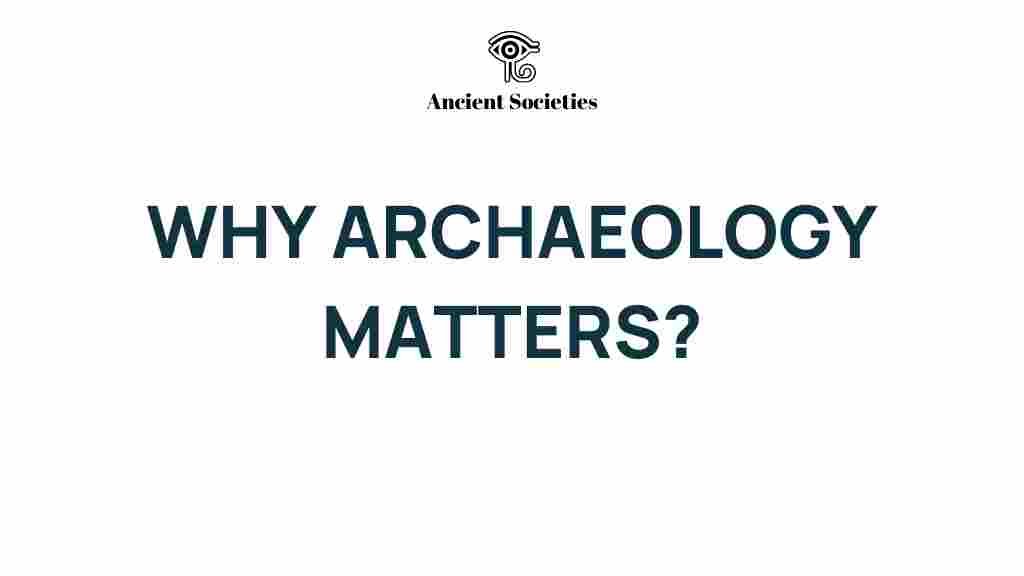Archaeology: A Window into Our History and Culture
Archaeology is the scientific study of human history and prehistory through the excavation and analysis of artifacts, structures, and other physical remains. This fascinating discipline not only helps us understand ancient civilizations but also plays a crucial role in preserving our cultural heritage for future generations. In a world where rapid modernization often threatens our historical sites, the importance of archaeology has become more pronounced than ever. This article explores why archaeology matters today, its societal impact, and how it helps us connect with our past.
The Significance of Archaeology in Understanding History
Archaeology offers a unique lens through which we can examine the complexities of human history. By studying artifacts, ruins, and ancient texts, archaeologists can piece together the stories of civilizations that flourished long before our time. Here are some key reasons why archaeology is significant:
- Revealing Ancient Civilizations: Archaeological discoveries provide insights into how ancient societies lived, their cultures, and their interactions with one another.
- Documenting Human Progress: The study of artifacts helps us understand the evolution of technology, art, and social structures.
- Preserving Heritage: Archaeology plays a vital role in the preservation of sites and objects that are of cultural importance.
- Informing Modern Society: Lessons learned from the past can guide contemporary decision-making, particularly in areas like urban planning and environmental sustainability.
How Archaeology Contributes to Cultural Preservation
Preservation is a cornerstone of archaeological work. The process of excavation and study not only uncovers artifacts but also ensures their protection. Here are some ways archaeology aids in cultural preservation:
- Site Management: Archaeologists often collaborate with local communities and governments to manage archaeological sites, ensuring that they are protected from damage or destruction.
- Public Education: Archaeological findings are shared with the public, fostering appreciation and understanding of cultural heritage.
- Restoration Projects: Many archaeological teams engage in restoration efforts, helping to rebuild and conserve ancient structures.
The Process of Archaeological Discovery
The journey of an archaeological discovery is meticulous and requires a systematic approach. Here’s a step-by-step overview of the archaeological process:
- Survey: Archaeologists conduct surveys of potential sites to identify areas of interest. This may involve aerial photography, satellite imagery, and field walking.
- Excavation: Once a site is selected, archaeologists begin excavation. This process is painstaking, as each layer of soil may contain valuable information.
- Analysis: Artifacts unearthed during excavation are analyzed in laboratories. This can include dating techniques, material analysis, and comparison with other findings.
- Publication: Findings are published in academic journals and shared with the public to contribute to the broader understanding of human history.
Challenges in Archaeology Today
Despite its importance, archaeology faces several challenges that can hinder research and preservation efforts:
- Climate Change: Many archaeological sites are threatened by rising sea levels, erosion, and changing weather patterns.
- Urban Development: Expansion of cities can lead to the destruction of sites before they can be studied.
- Funding Constraints: Many archaeological projects rely on grants and donations, which can be limited.
- Political Instability: In conflict zones, archaeological sites are often neglected or damaged.
Societal Impact of Archaeological Research
The impact of archaeology extends far beyond academic circles. It influences society in myriad ways:
- Cultural Identity: Archaeology helps communities understand their roots, fostering a sense of identity and belonging.
- Tourism: Well-preserved archaeological sites attract tourists, providing economic benefits to local communities.
- Interdisciplinary Collaboration: Archaeological research often intersects with fields like anthropology, history, and environmental science, leading to comprehensive understandings of human civilization.
The Future of Archaeology: Innovations and Technologies
As technology advances, so does the field of archaeology. New tools and methods are enhancing the way archaeologists conduct their research:
- Remote Sensing: Techniques like LiDAR (Light Detection and Ranging) allow archaeologists to identify structures hidden beneath vegetation.
- 3D Modeling: Creating 3D models of artifacts and sites aids in analysis and public engagement.
- DNA Analysis: Genetic studies of ancient remains provide insights into human migration and evolution.
For more information on the latest innovations in archaeology, check out this resource.
Getting Involved in Archaeology
For those interested in archaeology, there are numerous ways to get involved:
- Volunteer on Excavations: Many archaeological projects welcome volunteers who are eager to learn.
- Education: Pursue a degree in archaeology or related fields to deepen your understanding.
- Advocate for Preservation: Support local and global efforts to protect archaeological sites.
- Participate in Community Events: Engage with local museums or archaeological societies to learn more about your heritage.
Conclusion: The Enduring Relevance of Archaeology
As we navigate a rapidly changing world, the relevance of archaeology becomes increasingly apparent. It connects us to our history, enriches our culture, and informs our societal values. By studying ancient civilizations, we gain insights that can guide us in addressing contemporary issues. The preservation of our heritage is not just the responsibility of archaeologists; it is a collective duty to ensure that future generations can appreciate the richness of human history.
In a time when our global heritage faces numerous threats, the commitment to archaeological research and preservation must be stronger than ever. As we unearth the past, we also uncover the lessons that will help shape our future.
For more insights into historical research and preservation efforts, visit this site.
This article is in the category Archaeology and created by AncientSocieties Team
